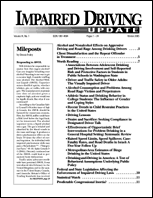Standardized Field Sobriety Tests and Strict Compliance: Science, Law, and Common Sense
Author: Todd F. Sanders.
Source: Volume 05, Number 03, Summer 2001 , pp.53-54(2)

< previous article |next article > |return to table of contents
Abstract:
For years, Standardized Field Sobriety Tests (SFSTs) have helped officers across the country detect drivers who are under the influence of alcohol and have been widely accepted by the courts as reliable indicators of impairment. Despite this widespread use and acceptance, defense challenges to SFSTs continue to emerge. In October 2000, the Ohio Supreme Court held that SFSTs conducted in a manner that departs from the methods established by NHTSA “are inherently unreliable” and, thus, inadmissible. (Ohio v. Homan, 732 N.E.2d 952 (Ohio 2000).) This article examines the issues raised in the Homan opinion. It begins with a history of the development of SFSTs, and then reviews other state court cases that have addressed admissibility issues related to SFSTs and field sobriety tests in general.Keywords: National Highway Traffic Safety Administration (NHTSA); Ohio v. Homan; Standardized Field Sobriety Tests (SFSTs); Georgia v. Pastorini; Tennessee v. Williams; Smith v. Wyoming; Florida v. Meador; Hawaii v. Toyomura; Illinois v. Sides; Pennsylvania v.
Affiliations:
1: National Traffic Law Center of the American Prosecutor’s Research Institute (APRI).